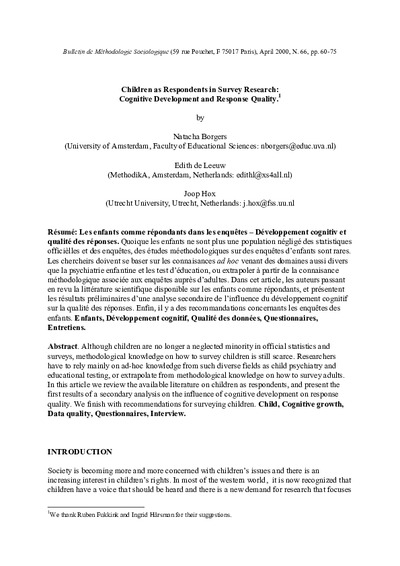 Diese Seite wurde seit 2 Jahren inhaltlich nicht mehr aktualisiert.
Unter Umständen ist sie nicht mehr aktuell.
Diese Seite wurde seit 2 Jahren inhaltlich nicht mehr aktualisiert.
Unter Umständen ist sie nicht mehr aktuell.
 Zusammenfassungen
Zusammenfassungen
Although children are no longer a neglected minority in official statistics and
surveys, methodological knowledge on how to survey children is still scarce. Researchers
have to rely mainly on ad-hoc knowledge from such diverse fields as child psychiatry and
educational testing, or extrapolate from methodological knowledge on how to survey adults.
In this article we review the available literature on children as respondents, and present the
first results of a secondary analysis on the influence of cognitive development on response
quality. We finish with recommendations for surveying children.
Von Natacha Borgers, Edith de Leeuw, Joop Hox im Text Children as Respondents in Survey Research (2000) Quoique les enfants ne sont plus une population négligé des statistiques
officièlles et des enquêtes, des études méethodologiques sur des enquêtes d’enfants sont rares.
Les chercheirs doivent se baser sur les connaisances ad hoc venant des domaines aussi divers
que la psychiatrie enfantine et les test d’éducation, ou extrapoler à partir de la connaisance
méthodologique associée aux enquêtes auprès d’adultes. Dans cet article, les auteurs passant
en revu la littérature scientifique disponible sur les enfants comme répondants, et présentent
les résultats préliminaires d’une analyse secondaire de l’influence du développement cognitif
sur la qualité des réponses. Enfin, il y a des recommandations concernants les enquêtes des
enfants.
Von Natacha Borgers, Edith de Leeuw, Joop Hox im Text Children as Respondents in Survey Research (2000) Methodological studies on adult populations have shown that adults may experience
problems with certain questions, and that question characteristics may affect the data quality
in surveys (for an overview, see Krosnick & Fabriger, 1997). Especially when questions are
very complex and/or when information has to be retrieved from memory, adults experience
problems (Eisenhower et al, 1991). With children as respondents, the same problems may be
magnified, as a slight error (e.g. ambiguity) in the questionnaire is more difficult to
compensate, or has a larger impact. Also, children may experience specific problems when
responding. The cognitive, communicative and social skills are still developing and this
affects different stages of the question-answer process.
Von Natacha Borgers, Edith de Leeuw, Joop Hox im Text Children as Respondents in Survey Research (2000)  Dieser wissenschaftliche Zeitschriftenartikel erwähnt ...
Dieser wissenschaftliche Zeitschriftenartikel erwähnt ...
 Personen KB IB clear | Bonnie Holaday , Anne Turner-Henson , Pauline Marie Vaillancourt | |||||||||||||||||||||||||||
 Begriffe KB IB clear |  Befragung von Kindern
, Befragung von Kindern
,  Fragebogen
, Fragebogen
,  Kinder Kinder children
, children
,  Lesekompetenz
, Soziale Erwünschtheit
, Lesekompetenz
, Soziale Erwünschtheit
,  Statistik Statistik statistics statistics
| |||||||||||||||||||||||||||
 Texte |
|
 Dieser wissenschaftliche Zeitschriftenartikel erwähnt vermutlich nicht ...
Dieser wissenschaftliche Zeitschriftenartikel erwähnt vermutlich nicht ... 
 Nicht erwähnte Begriffe | Eltern |
 Zitationsgraph
Zitationsgraph
 Zitationsgraph (Beta-Test mit vis.js)
Zitationsgraph (Beta-Test mit vis.js)
 5 Erwähnungen
5 Erwähnungen 
- Reliability of responses in questionnaire research with children (N Borgers, JJ Hox) (2000)


- Response Effects in Surveys on Children and Adolescents - The Effect of Number of Response Options, Negative Wording, and Neutral Mid-Point (Natacha Borgers, Joop Hox, Dirk Sikkel) (2004)


- Children and Adolescents as Respondents - Experiments on Question Order, Response Order, Scale Effects and the Effect of Numeric Values Associated with Response Options (Marek Fuchs) (2005)


- Designing and testing questionnaires for children (Alice Bell) (2007)


- Alter und Methode - Ein Vergleich telefonischer und persönlicher Leitfadeninterviews mit Kindern (Susanne Vogl) (2012)


 Volltext dieses Dokuments
Volltext dieses Dokuments
 |  Children as Respondents in Survey Research: Artikel als Volltext ( Children as Respondents in Survey Research: Artikel als Volltext ( : :  , 128 kByte; , 128 kByte;  : :  ) ) |
 Anderswo suchen
Anderswo suchen 
 Beat und dieser wissenschaftliche Zeitschriftenartikel
Beat und dieser wissenschaftliche Zeitschriftenartikel
Beat hat Dieser wissenschaftliche Zeitschriftenartikel während seiner Zeit am Institut für Medien und Schule (IMS) ins Biblionetz aufgenommen. Beat besitzt kein physisches, aber ein digitales Exemplar. Eine digitale Version ist auf dem Internet verfügbar (s.o.). Aufgrund der wenigen Einträge im Biblionetz scheint er es nicht wirklich gelesen zu haben. Es gibt bisher auch nur wenige Objekte im Biblionetz, die dieses Werk zitieren.











 Biblionetz-History
Biblionetz-History